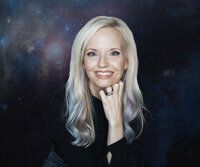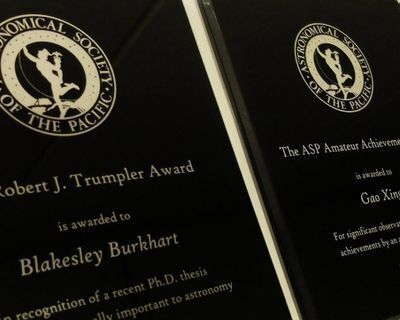Nominations for the 2026 ASP Awards open February 3 through March 31
-
The Klumpke-Roberts award will be given in 2026

2025 Klumpke-Roberts Award is given to Dr. Kimberly Arcand for her contributions to the public understanding and appreciation of astronomy as a popular science communicator and a leading expert in astronomy communications and data visualization
San Francisco, California- September 10, 2025 - Awarded to an individual or individuals who have made outstanding contributions to the public understanding and appreciation of astronomy, the Klumpke-Roberts Award for 2025 goes to Dr. Kimberly Arcand, for over 26 years of bringing astrophysics discoveries to broad and diverse audiences through innovative astronomy communication methodologies.
Arcand’s extraordinary contribution as the visualization scientist and emerging technology lead for the Chandra X-ray Center has, as one nominator professed, “played an essential role in bringing discoveries like Chandra’s to the world in a way that is both accessible and inspiring.”
Arcand began her career in molecular biology and public health before she moved into the Smithsonian Astrophysical Observatory to work for NASA’s Chandra X-ray Observatory in 1998. She currently serves as the communications and public engagement lead for the Chandra X-ray Center which is located at the Smithsonian Astrophysical Observatory in Cambridge, Massachusetts, and as co-investigator for NASA’s Universe of Learning. The cutting-edge contributions took Arcand into a world where she created a new approach to science communication. Her method of storytelling included a series that integrated traditional, high-end, science-driven technology products with accessible, hands-on, low-tech versions of key activities she and her team developed.
During her groundbreaking work Arcand has collaborated with organizations of all types both domestically and internationally including NASA, the Smithsonian Institution, the International Astronomy Union, UNOOSA, UNESCO, the U.S. Department of State, the U.S. Library of Congress, the National Park Service, Girls Who Code, Black Girls Code, and the National Federation of the Blind, to name only a few.
Accessibility has been one of the tenets of Arcand’s career. This is reflected in her research which led her to projects that conveyed the dimensional nature of objects in space using low-tech skills such as Legos, origami and paper circuits as well as emerging technology such as 3D printing, VR experiences, and sonifications. Her collaboration with Brown University included mentoring student interns to develop code for immersive experiences with such cosmic sources as supernovas and the Galactic Center. Her curated sets of 3D models were used by blind and low-vision (BLV) audiences and her viral program of sonifications opened a new genre of public interaction for both the sighted and BLV audiences.
Arcand has also developed innovative “public science” projects that placed scientific content in free public spaces such as parks, metro stations, town squares and more. These projects include the award-winning exhibit “From Earth to the Universe” giving open access to astronomy images and captions (and translations) shared in hundreds of communities around the world as well as “Light Beyond the Bulb” reaching 35 countries, over a dozen language translations, and providing Braille/tactile options.
Arcand, throughout her career, has mentored dozens of high school, undergraduate and graduate students, and early-career researchers, setting them on the path to become science communicators by involving them in communications strategies, data visualization projects, and public engagement initiatives.
Capping off her incredible accomplishments, was the impact she made with a massive public engagement and communications campaign celebrating Chandra’s 25th anniversary in 2024, reaching millions of people from Washington D.C. to Las Vegas. A documentary, “Listen to the Universe” and a Chandra sonification project, “Where Parallel Lines Converge” earned prestigious accolades. Arcand is also an author of popular science books with a ninth book coming out in February 2026. One nominator simply said, “She exemplifies the very best of what it means to be a science communicator in the 21st century, harnessing cutting-edge technology and creative storytelling to make the universe accessible to all.”
Join us in celebration of Kimberly Arcand’s achievements at the in-person ASP Awards Gala on Saturday, November 8, 2025 at the Hilton San Francisco Airport Bayfront, Burlingame, CA.
About the Klumpke-Roberts Award
For outstanding contributions to the public understanding and appreciation of astronomy
The ASP bestows the Klumpke-Roberts Award on those who have made outstanding contributions to the public understanding and appreciation of astronomy. Awardees include Carl Sagan, Isaac Asimov, Chesley Bonestell, Timothy Ferris, Walter Sullivan, Heidi Hammel, and the staffs of Sky & Telescope and Astronomy magazines.
Created in 1974, the Klumpke-Roberts award celebrates the importance the ASP places for scientists to help the public understand the new discoveries and developments in astronomy and their significance. It was named in honor of Dorothea Klumpke Roberts (1861-1942), a native San Franciscan who became the first woman to receive a Doctor of Science degree at the University of Paris. She worked at the Paris Observatory for many years on the gigantic Carte du Ciel project (a cooperative effort among many observatories to photograph the entire sky).
Dorothea Klumpke joined the ASP in 1890 (becoming one of the first female members). Near the end of her life, and then again in her will, she gave the Society money, to be known as the Klumpke-Roberts Fund in honor of her parents and husband (her husband Isaac Roberts had been one of the premier astronomical photographers). Her endowment was redirected in 1974 to create the Klumpke-Roberts Award.
Please contact the Awards team if you have questions about the nomination process

